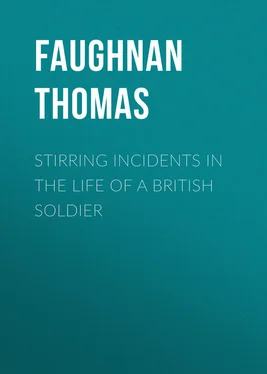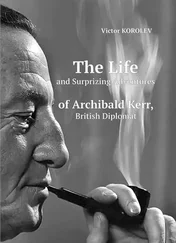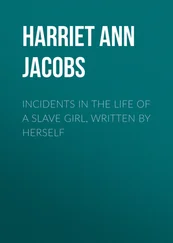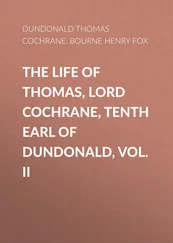Thomas Faughnan - Stirring Incidents In The Life of a British Soldier
Здесь есть возможность читать онлайн «Thomas Faughnan - Stirring Incidents In The Life of a British Soldier» — ознакомительный отрывок электронной книги совершенно бесплатно, а после прочтения отрывка купить полную версию. В некоторых случаях можно слушать аудио, скачать через торрент в формате fb2 и присутствует краткое содержание. Жанр: foreign_antique, foreign_prose, на английском языке. Описание произведения, (предисловие) а так же отзывы посетителей доступны на портале библиотеки ЛибКат.
- Название:Stirring Incidents In The Life of a British Soldier
- Автор:
- Жанр:
- Год:неизвестен
- ISBN:нет данных
- Рейтинг книги:3 / 5. Голосов: 1
-
Избранное:Добавить в избранное
- Отзывы:
-
Ваша оценка:
- 60
- 1
- 2
- 3
- 4
- 5
Stirring Incidents In The Life of a British Soldier: краткое содержание, описание и аннотация
Предлагаем к чтению аннотацию, описание, краткое содержание или предисловие (зависит от того, что написал сам автор книги «Stirring Incidents In The Life of a British Soldier»). Если вы не нашли необходимую информацию о книге — напишите в комментариях, мы постараемся отыскать её.
Stirring Incidents In The Life of a British Soldier — читать онлайн ознакомительный отрывок
Ниже представлен текст книги, разбитый по страницам. Система сохранения места последней прочитанной страницы, позволяет с удобством читать онлайн бесплатно книгу «Stirring Incidents In The Life of a British Soldier», без необходимости каждый раз заново искать на чём Вы остановились. Поставьте закладку, и сможете в любой момент перейти на страницу, на которой закончили чтение.
Интервал:
Закладка:
We had supper at six, oat-cakes, potato-cakes, and new milk, and soon after we were in the land of dreams, well tired from our march. Reveillé was sounded at five next morning, arousing the hitherto quiet village, when we were all on the alert; got breakfast of bacon, eggs, potatoes and milk, falling in for parade at seven, marching off with the band playing "Patrick's Day," which caused the people to shout and cheer. After a long march of sixteen miles we reached Athlone at two o'clock, dismissed to our billets, where dinner was ready according to instructions received in advance.
My wife fared much better to-day than yesterday. I had procured for her a seat on a side-car with the hospital serjeant's wife, by paying half the expense of the car. This is a good sized town, large barracks and strongly-fortified, on the Shannon, dividing Leinster from Connaught. We fared well here and got good billets. To-morrow will be Sunday; we will halt. We were allowed to indulge in a good sleep on Sunday morning, nothing to do before ten o'clock, only to get breakfast of ham and eggs; church parade in front of O'Rourk's hotel, where we were inspected and marched off to our different places of worship, the band playing, causing great crowds of people to assemble and accompany us to church. After dinner the men walked out in full dress; there were crowds of people and plenty of whiskey drunk during the day and night; great excitement to see so many soldiers in the town. At tattoo that night one corporal and six privates were confined, the corporal for being drunk, and the privates for minor offences. In the morning the six privates were reprimanded, and the corporal sent back for a court-martial on arrival at Castlebar.
We were on the march at seven o'clock, the band playing Patrick's Day and Garry Owen, as we marched out of town, cheered by the crowd. We were in good spirits, for every fellow had a parting glass with the landlord before parting, besides we were getting accustomed to the march. After a march of fifteen miles we arrived in Castleblakeney at two o'clock. This is a small town like Ballymore. During the march to Castlebar, we always started at seven every morning, and paraded at five every evening for inspection.
Next day at two o'clock, we reached Tuam, a fine town, where Archbishop McHale and Bishop Plunket reside, where we were billeted that night, marching as usual in the morning: next night at Holymount, arriving at Castlebar on Thursday, the 18th May, 1850, where we were to be stationed till further orders, accomplishing a journey of about one hundred miles in seven days. On arriving we were shown our quarters; bed filling at the barrack stores, and cleaning our appointments after the long march, occupied the remainder of the day.
The following day commanding officer's parade in heavy marching order at ten a.m., when we were minutely inspected and dismissed. We had good barrack accommodation and easy duty, the men getting ten nights in bed between guards. After we had been here a few days, we became aware of the fact that a contested election for a member of parliament was to take place in about three weeks, and we found great excitement among the people; the committee of each candidate were holding meetings and canvassing for their party; many rows took place between them, the public houses were continually crowded, police were brought here from distant stations, and, as the day of polling drew near, the excitement increased. On the day of voting two troops of cavalry arrived, and we were under orders to turn out at a moment's notice. On the morning of the election, the grenadiers and light company were drawn up in line on each side of the square fronting the court-house, with the two troops of cavalry. The voting commenced at ten o'clock; the police were all formed ready to pass the voters in and keep the crowd back, the voters were brought in from the country on sidecars, guarded from the mob by a policeman on each side of the car.
The people were very roughly used at first by the police, which raised their wrath, when they rushed with immense force on the police and thoroughly defeated them, forcing them to retreat to the lines of the military for protection. Having effected this object the crowd retained their position, but did not attempt to assault the soldiers, though their shouts of defiance to the police rose loud and long. The police were ordered to advance again and seize the ringleaders; they obeyed very reluctantly, but being assaulted with sticks and stones their individual courage was excited, and they rushed to chastise the mob, who again drove them back in greater disorder than before, and a nearer approach to the soldiers was made by the crowd in the scuffle which ensued. The police were again ordered to charge the mob, when a more serious scrimmage arose, sticks and stones were used with more effect, and the parties being nearer to each other, the missiles intended only for the police overshot their mark and struck some of the soldiers, who bore their painful position with admirable fortitude, although their patience was sorely tried to stand a target for the mob, but a soldier's duty is to obey orders in whatever shape they come from his officers, and therefore they had to put up with rough usage. The mob were now furious and the magistrate had to read the Riot Act before the soldiers could attempt to quell the disturbance; at last the military were ordered to fire, the captain giving the command, "with ball cartridge, load, ready, present, fire," the men were previously cautioned in an under tone of voice to fire over the people's heads.
This had the desired effect; the crowd dissolved as the muskets were brought to the present, after which they gave three cheers for the soldiers and down with the "peelers."
This act brought the soldiers into high esteem with the populace. The business of the interior was now suspended for a time by the sounds of fierce tumults, which arose after the soldiers had discharged the volley; some rushed from the court-house to the platform, and beheld the mob in a state of great excitement. A popular candidate now stood forward on the platform and was greeted with fresh cheers. He waited till the uproarious cheering died away, and then addressed them in a few words touching their nationality and the honour of their country.
After which the crowd gave him three hearty cheers, and quiet was restored, when the troops were marched into barracks, but kept in readiness should another row commence; but happily all were peaceable afterwards, although much excitement with plenty of whiskey continued for several days after, in which several of the soldiers joined.
After the election, our men were highly respected by the inhabitants; the old women brought the men bottles of "potheen whiskey" in their milk cans. The sergeant on the gate not suspecting any smuggling, saw nothing but milk in the can – but if he had searched the can he would have found a black bottle of the real "mountain dew" at the bottom.
After being stationed here three months we got the route for Galway, a town situated at the mouth of Lough Corrib; it is the west terminus of the Midland Great Western Railway, and 117 miles west of Dublin.
CHAPTER IX
THE MARCH – GALWAY – CAPTAIN BOURCHIER – DETACHMENT – REGATTA – ROW WITH THE POLICE – ROUTE TO GALWAY – MAJOR BOURCHIER EXCHANGES – CAPTAIN CROKER – CLADDAGH – ATTEND A CAMP MEETING – THE CITY OF GALWAY – THEATRE – ROUTE TO DUBLIN.
August 26th, 1850, at 7 a.m., we marched out of Castlebar; the townspeople accompanied us for some distance and gave us three hearty cheers on parting. We marched sixteen miles that day, and were billeted at Holymount. Previous to this, Captain Bourchier had applied for leave of absence for three months, which reached him here, when he started for England after bidding the company good-bye, and handing it over to Lieutenant Coulthurst. We all suspected that he was going to be married during his absence, which proved to be a fact, for on his return to the regiment in November he brought his wife with him.
Читать дальшеИнтервал:
Закладка:
Похожие книги на «Stirring Incidents In The Life of a British Soldier»
Представляем Вашему вниманию похожие книги на «Stirring Incidents In The Life of a British Soldier» списком для выбора. Мы отобрали схожую по названию и смыслу литературу в надежде предоставить читателям больше вариантов отыскать новые, интересные, ещё непрочитанные произведения.
Обсуждение, отзывы о книге «Stirring Incidents In The Life of a British Soldier» и просто собственные мнения читателей. Оставьте ваши комментарии, напишите, что Вы думаете о произведении, его смысле или главных героях. Укажите что конкретно понравилось, а что нет, и почему Вы так считаете.












